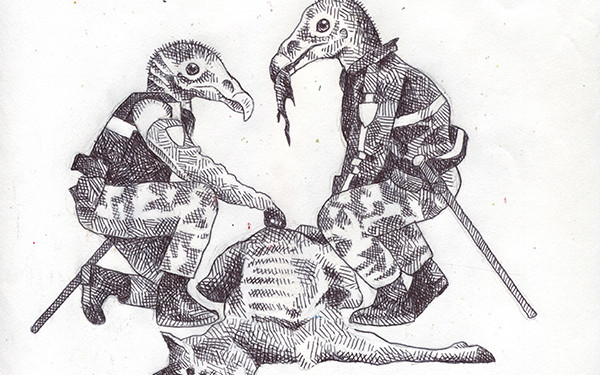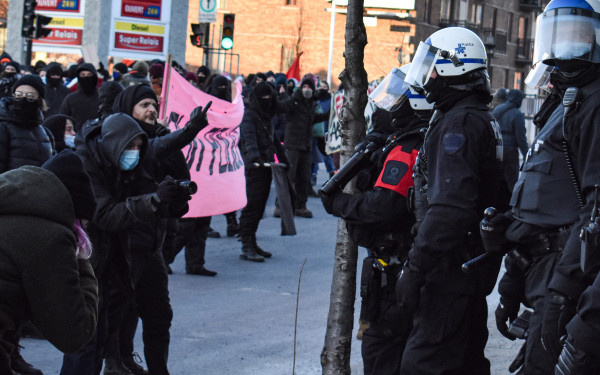Who Do We Trust?
Police Brutality Hurts More Than Its Victims—It Harms Society as a Whole
It seems impossible to turn on the television or pick up the newspaper without being confronted with yet another instance of police brutality. Videos of police officers punching unarmed citizens, thrusting a knee into their stomach or slamming them against the concrete have gone viral. Intimidation, threats of violence and unlawful detainment are just some of the weapons that round off the arsenal of illegal techniques which law enforcement uses to immobilize members of the public.
Unfortunately, these instances do not represent an aberration in policing. The reality is that police have a history of abusing their power in Canada. On Monday, March 14, Toronto police killed a young man, who people say was a close friend to Sammy Yatim—who was also killed by police in 2012. Last Friday, news emerged that a Toronto police officer who fatally shot Andrew Loku will not face criminal charges. Black Lives Matter Toronto has since occupied an area outside police headquarters to protest the lack of charges.
Some of us may also remember the G20 summit in 2010, when police and protestors met on the streets of downtown Toronto. Once the smoke cleared, the Office of the Independent Police Review Director —an Ontario police watchdog— concluded that the police breached civil rights, unlawfully detained protestors and engaged in acts of excessive force.
During the summit, protestors were arbitrarily swept up off the street and unlawfully searched. One protestor, Tommy Taylor, was restricted to handcuffs for almost 24 hours, while police removed his girlfriend’s bra—which they claimed she might have wielded as a weapon.
Perhaps less known is the case of a Toronto police officer who, in 2009, beat two robbery suspects—Neil Singh and Randy Maharaj—in custody, in order to obtain a confession. After they were apprehended, three police officers slammed, choked, punched and kicked the suspects during questioning. The beating left Singh begging for his life, and Maharaj with a fractured rib. These tactics led to an official statement from Maharaj.
Maharaj’s charges were eventually dropped, but Singh was initially sentenced to six and a half years, minus one year, due to police misconduct. Ontario Court of Appeal Justice Robert Blair eventually stayed Singh’s sentence, classifying the interrogation as torture according to the criminal code.
You don’t need to be a robbery suspect or a protestor to have your rights stripped by the police, though.
Walking along a sidewalk in downtown Toronto in 2009, a few friends and I noticed a slow-moving police cruiser travelling behind us. The police stepped out of the cruiser, and ordered us not to move. They instructed us to put our hands on the wall and spread our legs.
We were searched and questioned for two hours, during which an amused crowd gathered around to watch the unfolding scene. The police refused to provide any justification for detaining us. The two girls that we had taken out on a date decided they had waited long enough and eventually left.
When we were finally let go, the police informed us that we had matched the description of another group of Black teenage boys. Apparently they were also wearing blue jeans and baseball caps.
While I was frustrated by what had happened, my friend did not seem quite so surprised. He didn’t expect much more from the police. Fortunately for us, the only damage that had been done was to our pride, and the possibility of a second date.
Why is all this important? After all, aren’t these just isolated, sporadic incidents on the fringe of society? Perhaps, but there is a reason why we feel outraged when we see or hear about cases of police brutality. It is part of a very human response to perceived injustice.
Our moral sensibility pushes to the front of our mind powerful feelings of indignation when we see law enforcement harm the people they are supposed to serve and protect—even more so when these acts are done with impunity. It is important to note that, after the beating of Singh and Maharaj, no charges were brought against the officers. In fact, both of them were promoted to sergeants, and were reported to have made more than $100,000 in 2011.
Policing is a very important job. It also isn’t an easy one. Being a public servant involves being in a position of power—power that has to be used responsibly. It is precisely that responsibility which makes the job difficult.
We want, and need, to be able to trust the police, and believe that they will not neglect the responsibility that their job demands. And if they fail in that responsibility, we need to trust that they will be punished for it. The very existence of law enforcement depends on that trust. Every time the police transform a citizen into a victim of injustice, they violate the source of their authority.
Anyone who has been in a serious relationship, or has had a close friend, understands the importance of trust. In a very real way, an entire relationship pivots on integrity. When trust is broken, even once, the damage is unimaginable. What was bracing the relationship, and holding it together, begins to erode. The problem is that this process is not always obvious. Rather, it happens slowly and quietly. After a certain point, it is irreversible.
What is true for individuals tends also to be true for society in general. That is why even one case of police brutality is too many. It chokes the life out of the living, breathing faith that, as human beings, we have certain fundamental and inalienable rights regardless of merit.
What happens when the fragile trust that binds the social contract between the community and the police is shoved into the ground, or slammed against the side of a wall, or worse, killed? What happens when it becomes a lifeless ideal, when it isn’t realized, or is ignored, shamelessly? If we turn our back on these moral questions, then we should do so thoughtfully and consciously.
After all, victims of state-sponsored violence are killed not just by guns or police tasers, but by beliefs—which can be lethal too.

1_900_600_90.jpg)
2_900_596_90.jpg)
3_900_600_90.jpg)


(WEB)_600_375_90_s_c1.jpg)
_600_375_90_s_c1.jpg)

